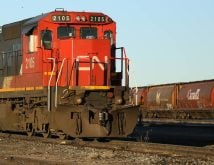Agricultural Producers Association of Saskatchewan calls for action on recommendation to increase competitiveness
Saskatchewan’s general farm organization has called for expanded railway interswitching to be implemented in May as recommended by a national task force last autumn.
Agricultural Producers Association of Saskatchewan president Ian Boxall said he hoped to meet with transport officials this week while in Ottawa to press the point.
Last October, the national supply chain task force recommended that the existing 30-kilometre interswitching rules be expanded by May 1. It said this would give shippers more rail options and address shipper-railway power balance issues. The recommendation also said switch zone rates should be mileage-based and set annually by the Canadian Transportation Agency, and the agency should monitor and review the effectiveness of the change.
Read Also

Using artificial intelligence in agriculture starts with the right data
Good data is critical as the agriculture sector increasingly adopts new AI technology to drive efficiency, sustainability and trust across all levels of the value chain.
“It’s not the be-all, end-all,” Boxall said. “This isn’t a huge win by any stretch, but we do feel that it is something that the railroads could do that could increase competitiveness and also give shippers (who aren’t getting service) an opportunity.”
APAS said 200 of the 203 licensed grain-handling facilities in the province are captive to a single shipper, and only 23 are within the 30-km radius.
He said farmers know from the measure that was in place during the Fair Rail for Grain Act from 2014 to 2017 that 160 km works. That could bring those 200 facilities into service by both railways.
“My question to the railroads is, why aren’t you just doing it?” Boxall said.
The railroads should be voluntarily implementing long-haul interswitching at reasonable rates, he said.
APAS also supports giving the CTA more teeth to keep the railways accountable. Boxall said more than half of Canada’s grain exports come from a province where shippers are captive to a single rail line. Greater transparency and accountability are critical.
In Ottawa this week, APAS is among the farm organizations attending agricultural meetings, including the Canadian Federation of Agriculture annual meeting and the Canadian Crops conference.
Boxall said drawing attention to interswitching and other issues is important as the federal government consults on its 2023 budget. He said APAS members are looking for policy changes and investments in the transportation system to help get products to market efficiently and quickly.
















